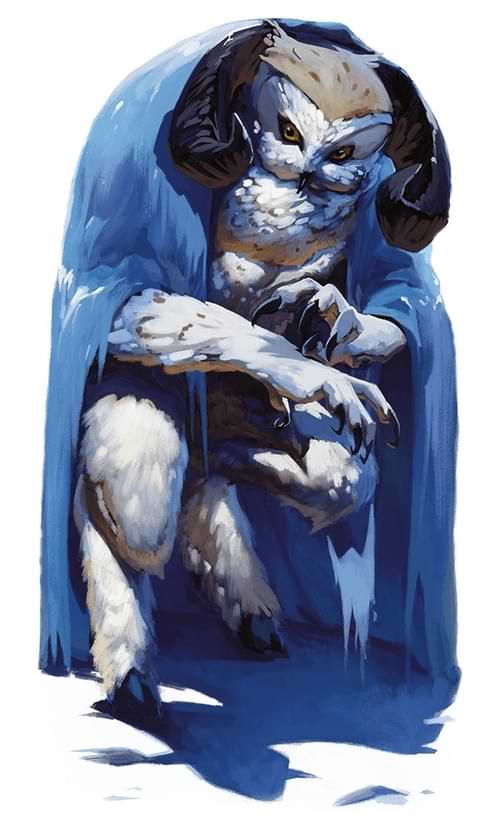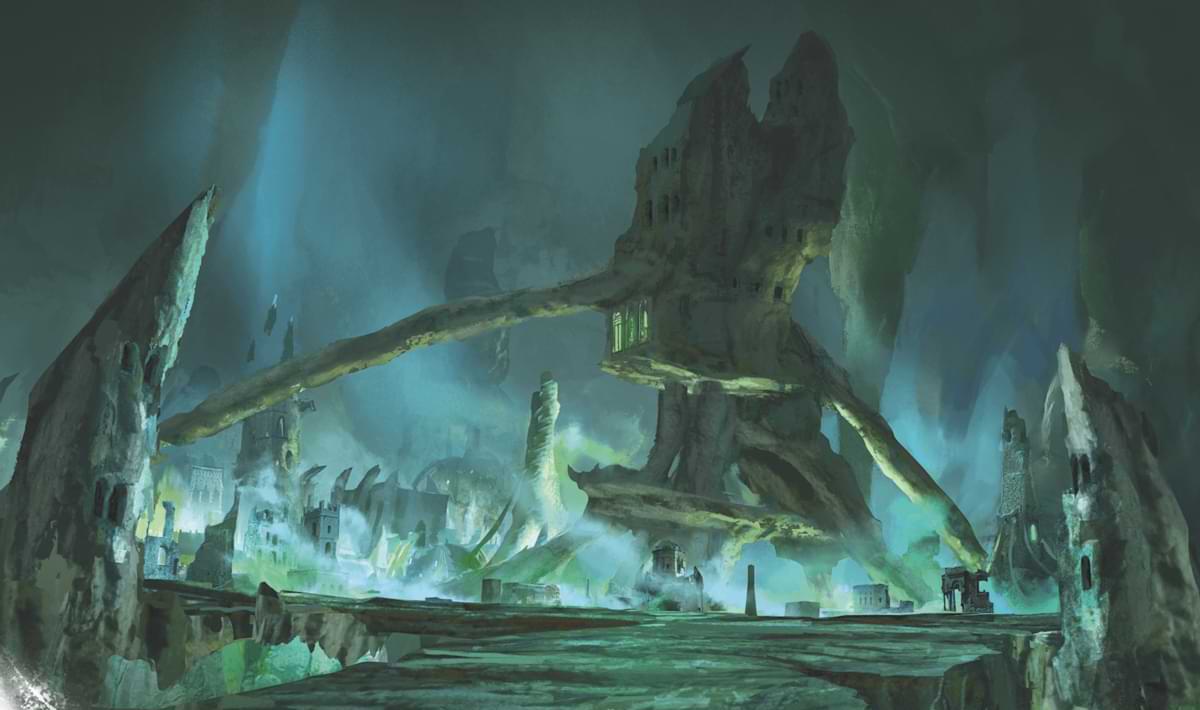
[ad_1]
For those looking for a frigid Dungeons & Dragons campaign set during the winter months, Icewind Dale: Rime of the Frostmaiden is a clear winner. Yet, Dungeon Masters might find themselves fuddled by Auril, the titular Frostmaiden herself.
Despite taking top billing, Auril remains an enigmatic figure throughout the adventure and is largely absent aside from what amounts to a mid-boss fight in the middle of the campaign and a possible appearance at the end. Luckily, there are a few strategies to develop her character, but first, let’s take a look at what we actually know about Auril herself.
Be warned! Spoilers for Icewind Dale: Rime of the Frostmaiden abound in this article!
The cold, hard facts on the Frostmaiden
A member of the pantheon of Faerûn since the first edition of D&D, Auril has typically been depicted as a fickle goddess of winter’s wrath. Those who worship her tend to depend upon winter for their livelihood or simply live in far-flung regions of the world where prayers to supplicant her harsh, unpredictable season are encouraged.
Auril has long been associated with Malar, Umberlee, and Talos — a lesser deity of the hunt, the greedy sea goddess of Faerûn, and the god of storms, respectively. All four were once referred to as the Gods of Fury due to their destructive tendencies.
Rime of the Frostmaiden takes place following the fracturing of the Gods of Fury. In a nutshell, Auril overstepped her boundaries by freezing the tides of Umberlee, and the sea goddess allied with Malar and Talos for retribution. Together, the three turned their might against Auril, who fled their wrath and escaped to Icewind Dale. When the adventure begins, Auril has turned the land into her personal wintery domain, with the pass to the south blocked off and everlasting blizzards slowly wearing down the morale of all unlucky enough to reside in the dale.
While this is an intriguing setup, Rime of the Frostmaiden stops there and doesn’t offer advice on Auril’s motives. Is she simply hiding from the other Gods of Fury or has she been literally blocked from the higher planes of existence? What is her end goal with Icewind Dale?
3 ways to flesh out Auril the Frostmaiden
Below are three ways to make Auril a more compelling villain:
- A devastated Auril wants the world to suffer alongside her
- Greater forces are manipulating Auril for their end goals
- Auril has turned Icewind Dale into a Domain of Dread
1. A devastated Auril wants the world to suffer alongside her
 The gods of ancient mythology — from the Greek denizens of Mt. Olympus to the children of Odin — were larger-than-life beings. When they felt wronged and unhappy, mortals suffered. The deities of the Forgotten Realms are no different, and if you want to emphasize the anger and resentment that Auril feels at the betrayal of her fellow Gods of Fury, lean into this characterization.
The gods of ancient mythology — from the Greek denizens of Mt. Olympus to the children of Odin — were larger-than-life beings. When they felt wronged and unhappy, mortals suffered. The deities of the Forgotten Realms are no different, and if you want to emphasize the anger and resentment that Auril feels at the betrayal of her fellow Gods of Fury, lean into this characterization.
This version of Auril is devastated at what Umberlee, Malar, and Talos did to her, and for an added twist, perhaps her three former colleagues have stripped her of her power and magically blocked her from accessing her divine realm in the plane of Pandemonium. (This realm, called Winter’s Hall, was mentioned in older D&D books, including the third edition Manual of the Planes.) Auril wants nothing more than to find a way back to her celestial home. Trapped on the mortal plane, though, all she can do is fester in frozen fury. She wants everyone to suffer as she has suffered, and Icewind Dale’s neverending winter is a reflection of these intense emotions.
In my version of Rime of the Frostmaiden, I ran with this approach and tweaked lore to make the Gods of Fury not just a minor pantheon with a shared penchant for destruction, but also a quartet of capricious, backstabbing lovers who were just as likely to engage in romance as they were to steal followers and territory from one another. This added an extra dimension to Auril, since the love she had felt for the other gods had turned to icy hate. For inspiration with this approach, check out games like God of War and Hades which present the foibles, sins, and passions of ancient deities, as well as the webcomic Lore Olympus.
2. Greater forces are manipulating Auril for their end goals
Maybe the Frostmaiden is only a cog in a wheel of machinations. This approach makes sense considering that Auril only plays a relatively small role in Rime of the Frostmaiden, with a number of other threats more front and center. Chief among these are a clan of duergar who want to ravage the land with a mechanical dragon built from the demon-tainted material known as chardalyn, and a group of conniving spellcasters from Luskan’s Arcane Brotherhood who hope to explore Ythryn, a lost section of the ancient Netheril empire that lies frozen in Icewind Dale’s glaciers.
The duergar and the Arcane Brotherhood wizards can both serve as “big bads” who are taking advantage of Auril to further their own goals. The duergar, in particular, are secretly being manipulated by Asmodeus for reasons that are never entirely explained, but one can surmise that the Lord of the Nine Hells simply wants to foster chaos on the Material Plane. Perhaps he’s communicated with Auril and promised her a return to the heavens if she keeps up her winter long enough for his duergar minions to complete their mission.

The Arcane Brotherhood, on the other hand, might be intent on looting Ythryn of its artifacts, and have forged a deal with Auril to give her access to the ultimate magical item hidden within the adventure’s conclusion — a staff of power that can activate ancient obelisks and reset the world, potentially returning everything to an era predating both Auril’s exile and the fall of the Netheril empire.
Dungeon Masters versed in other Forgotten Realms gods might want to swap Asmodeus for another potential behind-the-scenes mastermind, such as Levistus, Asmodeus’ chief rival in the Nine Hells. Since Levistus is trapped in an ancient iceberg and always searching for a way out, he thematically fits into Rime of the Frostmaiden perfectly. In my game, I had him as the secret overlord influencing the duergar and the Arcane Brotherhood, and his ultimate goal was to activate a portal hidden within Ythryn that led to Stygia, his layer of the Nine Hells. Once the portal was opened, he would have the chardalyn dragon constructed by the duergar breathe magical flames onto his icy prison, freeing him at last. Auril was merely a lesser god that he had subtly influenced to hide his true plans, and my campaign actually held the potential for my players to team up with the Frostmaiden in the final battle against Levistus.
3. Auril has turned Icewind Dale into a Domain of Dread
For an Auril who’s fallen into darkness far beyond redemption, look to Van Richten’s Guide to Ravenloft for inspiration on the Domains of Dread. These fiendish demiplanes are surrounded by mists and pulled into the Shadowfell by enigmatic forces known only as the Dark Powers. Each Domain of Dread is presided over by a being called a Darklord. The Darklords are imprisoned in their domains and endlessly tormented by the Dark Powers but often cannot see this due to a habitual tendency for deep evil.
Icewind Dale can easily be converted into a frosty Domain of Dread with Auril as its Darklord. One can say that Auril’s hatred of the gods who backstabbed her, as well as the wrath she has unleashed upon the innocents of the dale, led the Dark Powers to target her. Only by defeating her can the heroes break free of the mists surrounding Icewind Dale long enough to escape the Shadowfell.
Icewind Dale: Rime of the Frostmaiden already contains much dread, with human sacrifice practiced in Icewind Dale’s Ten-Towns, coldlight walkers inspired by the poster for John Carpenter’s The Thing wandering through the wilds, and the eerie ruins of Ythryn radiating cosmic eeriness straight out of H.P. Lovecraft’s At the Mountains of Madness. Leaning further into these tropes is the perfect way to turn the campaign into a full-on horror experience reminiscent of the greatest Ravenloft adventures.
The maiden of frost cometh
Despite the fact that her motivations require some tweaking, Auril is quite the memorable D&D villain. Whether you intend on presenting her in a more sympathetic light or as an irredeemable Darklord, keep in mind that she is ultimately a god, and should always send shivers down the spines of your players. Once you’ve determined her motives and want to run Auril in combat, be sure to check out our ideas here for the best tactics on showing your players the extent of her icy powers.
Jeremy Blum (@PixelGrotto) is a journalist, gaming blogger, comic book aficionado, and fan of all forms of storytelling who rolled his first polyhedral dice while living in Hong Kong in 2017. Since then, he’s never looked back and loves roleplaying games for the chance to tell the tales that have been swirling in his head since childhood.
[ad_2]





